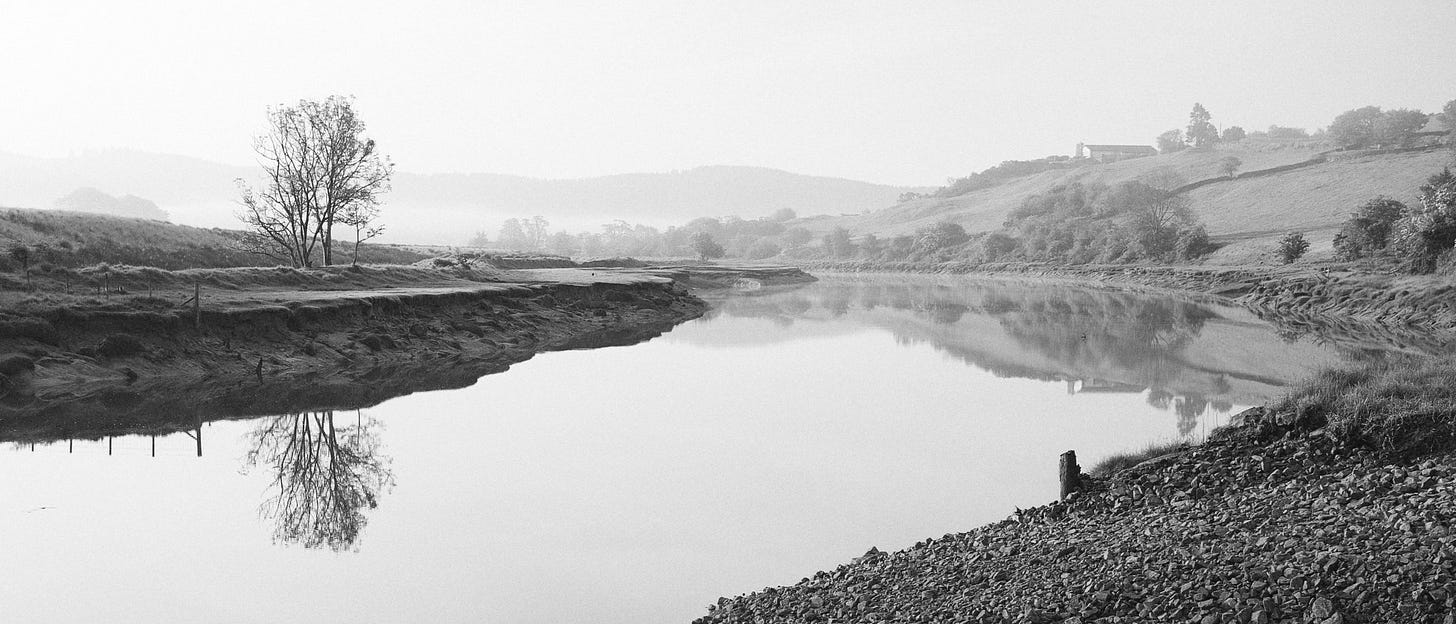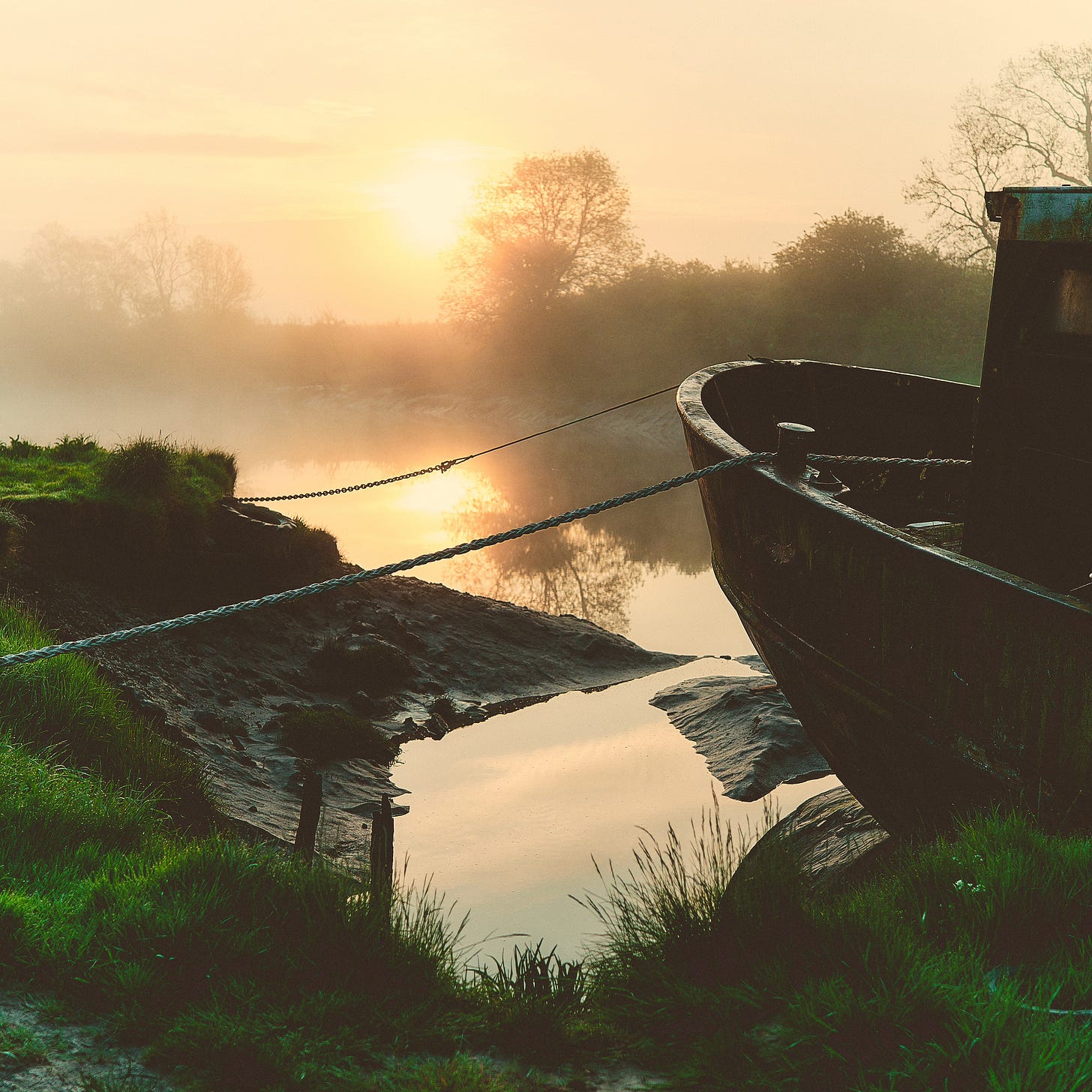Palnackie — High Court case update
Progress on the process of holding to account raiders of public land and money
Many readers have been tracking the unfolding story of the tiny port in Palnackie, Scotland, and the priceless principles being fought over there. Public land is being stolen, critical travel rights are being strained, vested interests are behaving badly, and systems for bringing accountability are being tested. What looks like a trivial tussle over an obscure muddy inlet is a litmus test of whether the public are capable of managing shared ownership assets, or if we are hopelessly subjugated to modern privateers and their asset stripping agenda.
For those new to the saga, you can catch up via my prior articles:
The pirates of Palnackie outlines the overall situation and stakeholders.
The white roses of the 2020s discusses raising public awareness of the need to manage their own asset.
“All we are doing is making them follow the law” provides an update of the soap opera of mischief by monied and corporate interests.
Public call-up to High Court, London — Palnackie gives the context for the High Court hearing to hold former trustees to account.
The healing beauty of the lawful workgroup discusses the personal impact of my trip to the High Court and seeing justice “done right” for once.
"I want it to be there to benefit my grandchildren" gives my readout of the case after the hearing but before the judgment.
The final judgment has been issued by the High Court, and it has concluded that the appropriate venue for these matters is in Scotland, and not England. While this may delay and complicate matters, it is not a setback. Quite the opposite: having clarity from the High Court in London removes a potential future roadblock in Scotland, as jurisdiction is now settled — as case law. That ordinary people, being appropriately informed and determined, can pursue a public interest case of this nature is not to be dismissed lightly. It is blazing a path that encourages others facing injustice to act using the lawful tools at our disposal.
The full judgment can be read here.
I got ChatGPT to make a summary, and it does a good job:
The judgment from the High Court of Justice concerning the Urr Navigation Trustees (UNT) primarily focused on the issues of jurisdiction and the legal status of UNT. Here are the key points:
Jurisdictional Challenge: The case raised a significant question about whether the English courts had jurisdiction over a dispute involving the Urr Navigation, a trust port located in Scotland. The Defendants challenged the English court's jurisdiction, suggesting that the case should be tried in Scotland.
Background and Status of UNT: The Urr Navigation Trustees were established under the 1901 Order, aimed at managing a harbour area in Scotland. Over time, UNT was perceived as possibly defunct, and there were alleged unauthorised transfers of property and income by certain individuals.
Legal Arguments: The Claimants argued that despite the Scottish location of UNT, the trust was created under an English statute, implying that English law should govern and thus jurisdiction would be appropriate in England. However, the court concluded that UNT had its most substantial connections with Scotland, especially since the trust's activities and assets were located there.
Domicile and Legal Personality: The court discussed whether UNT was a trust, a body corporate, or both. It was noted that UNT held property with obligations tied to maintaining specific harbour areas, suggesting characteristics of a trust. Yet, UNT was also incorporated with legal personality, capable of suing and being sued, indicating traits of a corporate entity.
Jurisdictional Decision: The judgment concluded that the English courts did not have jurisdiction. The court emphasised that the most substantial and real connections were with Scotland, including the location of the trust's administration and the property involved.
Forum Non Conveniens: Even if jurisdiction was technically possible, the court suggested that Scotland would still be the more appropriate forum (forum non conveniens), considering the local nature of the legal and factual issues involved.
The court directed that the case should be dismissed in England due to lack of jurisdiction, recommending that the parties consider Scottish courts for pursuing their claims.
I also asked both of the Claimants, Tim Dennis (current Chairman of the trust) and Darren Scott (Harbour Master), to comment upon the judgment.
Tim says: “I take this outcome as a positive, and am happy to take the matter of holding former trustees to account to the Supreme Court in Edinburgh. The judgment has clarity, and understands the situation and our motivation in bringing the case to the High Court in London. There are ongoing acts by Buittle Quest [the dodgy charity that received stolen public land] and Scottish Water [who are rebuilding the harbour wall] and it is much easier to engage with them with this in hand. As a current trustee it also empowers me; I have been researching my obligations, and the judgment aids me in reaching out to local stakeholders.”
Darren says: “This is quite an unusual case, and it is good we have jurisdiction sorted out. It is interesting that the judge refers to the jurisdiction matter as a debate, which is an unusual thing in an adversarial legal system. Trust ports are a complex subject, and not grasped easily. The judge was having to learn about them in the case, and some of the nuance may have been left out. A trust port enables navigation, yet there are some things the Urr Navigation Trustees cannot do, as they involve natural persons on the water itself.”
“With any trust we need certainty over what the trust property is, who the beneficiaries are, and what the trust needs to do with the property for their best interest. The judgment skirt around the possibility of it not being a real trust, but I think that if Parliament says it is a trust, then it is a trust in any meaningful legal sense. It may also be a body corporate, and on the neighbouring River Nith they have commissioners rather than trustees. But in a way it doesn’t matter what we label it — Parliament can call black to be “white” in legal terms if it so wishes.”
“All we are doing is interpreting the document they created in 1901. At the time Parliament had control over whole of UK, and was able to write Scottish laws. Since then Parliament has passed a devolution bill, which complicates matters. Some laws are specific to parts of the UK. For instance, the Highways Act 1980 says anyone can fill in a pothole in England and bill the council for their effort. Whereas the Roads (Scotland) Act 1984 doesn’t permit that arrangement. In this instance, the act of navigation itself — the crux of the matter — is clearly defined to be in Scotland. On this basis, the judgment is correct.”
“The harbour jurisdiction over navigation does not extend even as far as the Solway Firth, let alone to English waters. That said, it is an English law, and there is an arguable case for English jurisdiction; it is quite possible for an English law on Scottish matters to specify that it is regulated via English courts. This judgment could have been either way, and there are reasons for both sides. As such, it is not a loss to the Defendants. Our points stand: the facts are in agreement, just the conclusion in law from those facts differed.”
“What is made clear in the judgment’s interpretation of the law is that Parliament meant the Urr Navigation Order to be local legislation. The issue is then how courts interpret that. What if the address of one of the Claimants had been in Wales? Or the land had been stolen by Albanian gangsters? How we deal with devolved situations like this is unclear and confusing. All that said, what we needed was a decision — and the judge honestly gave it. While it would be handy in terms of ease of process to pursue accountability in English courts, we can move on and do it in Scotland, even if the procedure is a lot different.”
“What makes the judgment unusual is not only that it frames the jurisdiction issue as a debate in spirit, but it also goes further and gives advice on how to pursue the case. It essentially tells us where to go and how to do it! The parliamentary Order says that any income must be spent on the river or put into the reserve fund. That’s all we need the former trustees to account for: it’s completely clear-cut, as they didn’t spend the money on the river or put it into a reserve fund. We don’t need to get wrapped up in nuances of jurisdiction, trust law, or the body corporate. This is a simple matter for which they are personally liable.”
“I am still digesting the judgment and what the next steps are. We may have to take the current Urr Navigation Trustees to court, who then are acknowledged as being the lawful trustees, but who pass liability back to the former delinquent trustees to get them to account for where the money went. This has everything in order and everyone in the right place. Thankfully there is now no fuzziness on the actual issue, which is that Parliament said money has to be spent it on the river or put it into a reserve fund, and they broke that law.”
“By going to the High Court in London we have gained a judgment that can go as far as any judge can dare to help the public interest, in very good language. Mr Justice Adam Johnson has gone on to say things he didn’t need to say to help us, as reading between the lines he sees this as a noble endeavour. The Claimants have nothing to gain financially, and lots to lose. I have been to the High Court a few times, and never had an experience like this one. Previously it has always been very adversarial, but this is everybody’s harbour — including the judge’s, and belongs to the Defendant’s barrister too.”
“I plan to do what he says, and go to the Court of Session — admiralty division — to ask for an account of how the public’s money was spent. This includes £3k misspent on legal fees, a donation to another mooring association in Kippford, and thousands misallocated to the Buittle Quest charity in a manner that does not relate to improving, maintaining, or regulating navigation on the River Urr. It is a very simple argument, with a single paragraph on the claim form, and avoids getting lost in the minutiae of trust law and fiduciary obligations. There is no need for any witness statement if we focus on just where the money went, as the facts speak for themselves.”
“I don’t know the Scottish legal system so well, so I will use the summer to read up and research, so we can proceed with the case next winter. I can do this in collaboration with Tim and the other trustees. In terms of trust law, we are looking at the “contribution” to the trust, and the specific rules in Scotland that govern it. This has become more pressing, as Buittle Quest [who got the stolen land] is now trying to charge mooring fees for use of its side of the harbour, which is flat-out fraud and a breach of the common law right of navigation.”
“By going to the High Court in London we have a judgment that is fact in law — that’s what courts do. What the judgment says is more than a barrister’s legal opinion: it is now settled case law. The impact is wider than just in Palnackie, and could go to the Privy Council that ultimately owns the governance issue. Having a High Court judgment legitimises the issues we are facing. Resolving them takes a lot of research work, and Scottish law — other than statutes — is virtually impossible to study outwith a law library. This is quite different to the situation in England, as you really have to know what you are asking for.”
“This judgment is a credit to the judiciary, as it sets a good precedent. The judge narrowed it down, got rid of the fuss, and hit the point of the nail. In doing so, he worked for the public, being impartial between arguments. His interest was the law, and the people protected by the law. The original Order is not a punishment law; it is designed to protect. The judge had to interpret words written over 100 years ago, and what they meant in the minds of the people at the time, in the context of a different unity of the kingdom we inhabit. He did that confidently, offering his opinion as a judgement, but without making a declaration that usurped their lawmaking authority.”
Tim and Darren thank readers who contributed sufficient to cover all the travel costs to London for six people. It made a huge difference. Everyone is putting their time in for free, and the official systems that are meant to hold people to account are either complicit (parish council, local newspaper) or indifferent (police, regulators). Hopefully this shines some light on what it takes for us as individual members of the public to step up and shoulder the responsibility to manage these assets, and pass them on to future generations in the best possible shape — physically and legally.










Nice outcome and some lovely pictures. :-)
Yeeee-Haaaaah ;-)